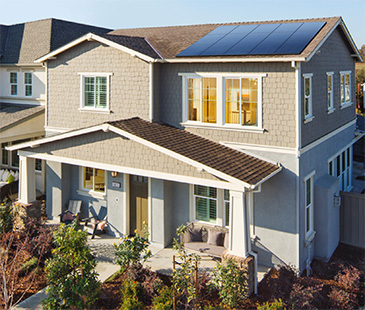
Earth Month is around the corner, and it's a reminder of us how important it is to live a greener lifestyle — not just in April but all year long. Accomplishing this doesn't have to be difficult AND living greener can help save homeowners money. Here are some tips for living a green lifestyle.
10 ways to save money going green
Declutter and downsize
Get organized by creating a system to help keep stuff — from stray papers to furniture — from entering your house without a good reason. For instance, go through your junk mail daily or weekly instead of tossing it in boxes you'll never go through. Then, make sure the paper ends up in the recycling bin. Then follow these AARP tips to purge the stuff you already have. Sell unwanted possessions at a yard sale or give them to a second-hand store. It may turn out you could even move to a smaller, less expensive residence.
Go higher tech
This can be as simple as changing a light bulb. Replace incandescent light bulbs with LED bulbs that save 75 percent more energy and last 25 percent longer. You can also start replacing energy-hogging appliances such as dishwashers and televisions with Energy Star-qualified appliances. Replacing electric appliances with ones that use natural gas is often a smart move as well. A gas stove can operate for less than half the cost of an electric one. Before buying these big durable goods though, be sure to do some research. For instance, programmable "smart" thermostats can save money for people who are away from home a lot. But they may not be best for those who are home most of the time.
Don't forget low tech
The best thermostat in the world won't save as much energy as a properly insulated house. Weather stripping, caulking holes and padding windows can save energy and money. According to the U.S. Department of Energy, millions of Americans may be eligible for weatherization services that can cut these costs. Get an energy audit to find out the best ways to save energy in your house.
De-pollute your commute
A typical passenger car emits 4.6 metric tons of carbon dioxide per year, and most of that is produced from your work commute. Car emissions are one of the biggest contributors to climate change and cause pollution that's a threat to public health, contributing to breathing problems such as asthma. Do you live close enough to work to walk or ride a bike? Consider using public transportation even just a couple times a week or see if your workplace can help you organize a carpool or let you telecommute part-time. Even occasionally commuting green can reduce pollution and reduce the demand for fossil fuels. And it will save you money on gas and car maintenance and repairs. If you do have to drive, check out the fuel economy of your car and use the EPA's Green Vehicle Guide when you buy your next car — which hopefully will be an electric vehicle or a hybrid.
Resist upgrading
Producing just one smartphone pumps about 178 pounds of carbon into the atmosphere, and most of us will only use that phone for two years. Using your cell phone beyond the normal two-year timeframe helps fight climate change while saving money. This same principle applies to other manufactured products — clothes, furniture, carpets, etc. Using what you've got or buying second-hand can save money and reduce pollution.
Eat more greens
About 40 percent of the food in the United States gets thrown away, and households are the biggest culprits. The food that winds up in landfills produces methane, a major contributor to climate change. So try to throw away less food. And if you need to get rid of it, try composting so that the food can be used to grow plants. You should also consider going meatless once a week or more. Livestock and their byproducts are responsible for 51 percent of CO2 emissions worldwide, according to the EPA.
Get your hands dirty
If you don't garden, consider starting. If you already do, think green. Reduce or eliminate the use of fertilizers and chemicals and instead use home-grown mulch made from those old food scraps you're no longer discarding and other yard waste. If you grow vegetables, you're producing your own food on the cheap. But whether you can grow food, flowers or both, always give a high priority to native plants that cause a buzz in the local insect community. For instance, if you live on monarch butterfly migration routes, plant as many milkweeds as possible. The destruction of milkweeds by herbicides has caused monarch populations to plummet in recent years.
Rainy day savings
Install rain barrels to help cheaply and efficiently water your plants. Lawn and garden watering can take up more than 40 percent of your water budget. Rain barrels can provide up to 1,300 gallons of water that can be used to wash the car, clean the driveway and just about any other use that doesn't require drinking or bathing.
Walk on the wild side
While taking a hike won't directly lower your bills or save the environment, numerous studies show it will help make you a saner, healthier person. Walking in nature can improve short-term memory, lower stress, boost the immune system, ease inflammation, fight depression, get you in better shape and improve your outlook on life. That's going to save you a lot in health care bills over time. Nature hikes also bring you closer to plants and animals you'd never otherwise see. What better way to honor Earth Month than connecting more closely with the planet this way!
You have the power
As a solar company with more than 33 years of experience in solar technology, we'd be remiss to not include on this list a suggestion to install a home solar system. Not only can you enjoy lower electricity bills, solar will help protect you from utility rate increases, and your home will likely have a higher resale value. And if you purchase your solar system before the end of this year, you can qualify for a 30 percent federal solar investment tax credit. (The credit will be reduced in subsequent years.) As a pioneer in clean energy, we've installed more than 8.2 gigawatts — or more than 25 million solar panels. SunPower® solar panels are the most efficient*Most efficient solar on the market: Based on search of datasheet values from websites of top 20 manufacturers per IHS, as of January 2019, durable*Most durable: "Fraunhofer PV Durability Initiative for Solar Modules: Part 3". PVTech Power, 2015. technology on the market,,2 with an expected useful life of more than 40 years*"SunPower Module 40-Year Useful Life," SunPower white paper. 2013. Useful life is 99 out of 100 panels operating at more than 70% of rated power. and backed by our 25-year warranty.

